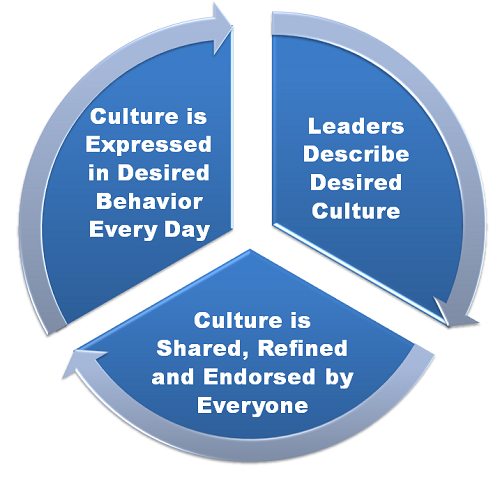Over the years we have seen the leadership role becoming increasingly demanding. Many expectations are placed on leaders, and a crucial role is to create a unique culture that guides employees to fulfill the organization’s promise to its customers. Ed Schein, one of the prominent organization thinkers and writers, says, “The only thing of real importance that leaders do is to create and manage culture.”
So exactly what is an organization’s Culture? There are many definitions; here is ours:
- It’s how we do what we do.
- It’s the set of values that direct our Behaviors and support or undermine our success.
Where does our organization’s culture come from?
- It is formulated by leaders, members, customers and stakeholders.
- It emerges from the organization’s industry or profession.
- It grows on its own without anyone’s real awareness—and without regard to whether it helps or hurts talent retention, productivity, or customer satisfaction.
How is it communicated and renewed? Two ways:
- Deliberately, guided by a formal process
- Automatically and unconsciously
We suggest that lack of focus on culture undermines success. Leaders need to take charge of it.
Whether culture is expressed in a Vision or Mission statement or less formally communicated, it is often formulated and adopted by leaders at a business planning retreat where leaders are challenged – often by consultants like us – to think of the most energizing description of their desired culture.
In fact, like Schein, we believe an essential role of leaders is to create, monitor, communicate and renew their culture so that it is a living part of the organization. The culture is expressed in the Behaviors of all members day-to-day, which demonstrates that it has been adopted.

Often the Culture is described by a list of the Values that express the intent of the leaders and employees. Values often include such qualities as Respect, Innovation, and Teamwork.
While Values offer a powerful guidance system for leaders and members, the real opportunity is to specify the Behaviors that express these Values and that the organization seeks in prospective employees and rewards in talented ones. Behaviors are how Values come alive day-to-day and guide important decisions, especially at tough times.
Michel Feaster, the Chief Executive of Usermind, a tech firm, was quoted in the New York Times on this subject; “One thing I recognize now is that culture isn’t about values; it’s about behaviors. And I think people often confuse the two. The problem with values like respect and courage is that everybody interprets them differently. They’re too ambiguous and open to interpretation.”
Feaster goes on to cite “the two things that are most important to me are grit and integrity. And integrity is a big word, but to me it means telling the truth. It means doing what you say you’re going to do.” Grit and integrity are recognizable behaviors to Feaster.
What is the short list of Behaviors that matter most to you? This is the foundation of a successful culture. Next is helping everyone embrace these Behaviors, making the culture come alive!
Consider discussing with us the ways to strengthen your culture by clarifying and enhancing the Behaviors that express it and that help your company succeed. For more information on the role of leaders and ways to develop a robust culture, see https://vogelglaser.com/building-teams-collaborative-culture/
